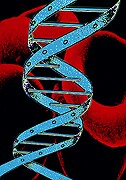
WEDNESDAY, April 14 (HealthDay News) — A mutation in a gene called Kv1.1 appears to be associated with irregular heart beat and sudden death in people with epilepsy, a new study finds.
People with epilepsy who are otherwise healthy are 10 times more likely than normal to die suddenly and unexpectedly. It’s long been suspected that the abnormal ion channels in cells that cause epilepsy also increase the risk of sudden death by affecting the heart.
Ion channels are proteins involved in nerve cell communication. In humans, the potassium ion channel Kv1.1 helps regulate electrical signals in the brain. Mutation of the gene for Kv1.1 has been associated with spontaneous seizures, abnormal muscle movement, and problems with motor coordination. This new study found that mutation of the Kv1.1 gene also affects heart function.
Mice that were bred to lack the gene for Kv1.1 channels showed signs of severe epilepsy and involuntary movement, and died prematurely due to erratic heart rhythms caused by problems in communication between the brain and the heart.
Study authors speculated that in mice without Kv1.1 channels, the vagus nerve — which helps regulate cardiac rhythms by sending brain signals to the heart — loses control. The nerve then “sends extra impulses to the heart, telling it to slow down, and even stop beating, when it shouldn’t,” study first author Edward Glasscock, of Baylor College of Medicine in Houston, Texas, said in a news release.
The findings, published in the April 14 issue of The Journal of Neuroscience, could lead to better treatments for at-risk patients, the researchers said.
More information
The U.S. National Institute of Neurological Disorders and Stroke has more about epilepsy.

